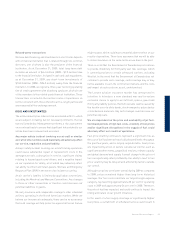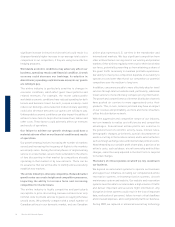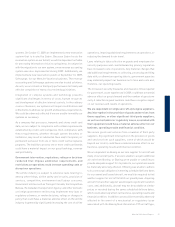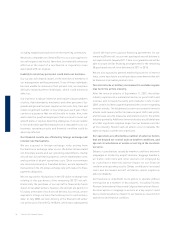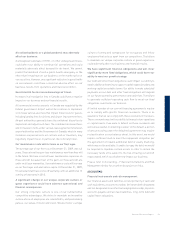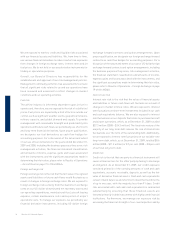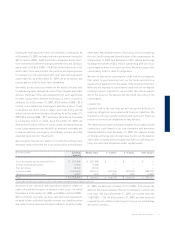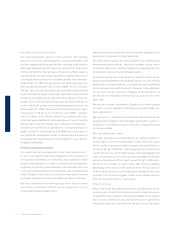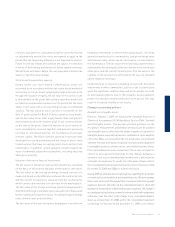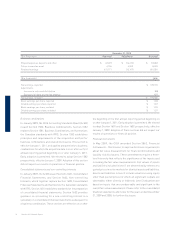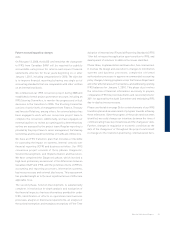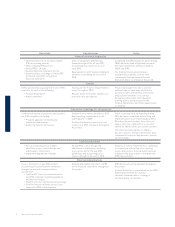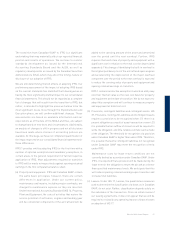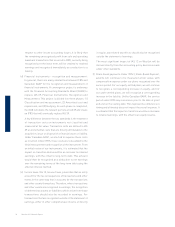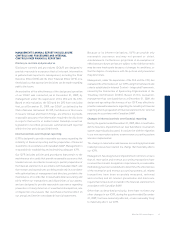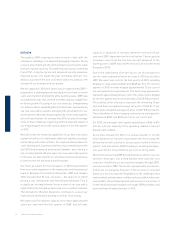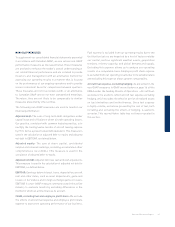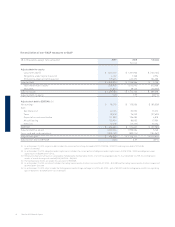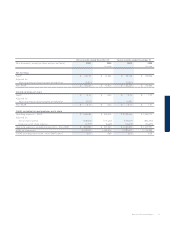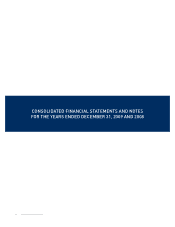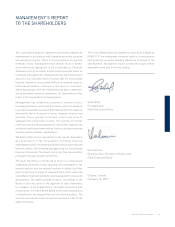Westjet 2009 Annual Report Download - page 65
Download and view the complete annual report
Please find page 65 of the 2009 Westjet annual report below. You can navigate through the pages in the report by either clicking on the pages listed below, or by using the keyword search tool below to find specific information within the annual report.
WestJet 2009 Annual Report 35
Adoption of International Financial Reporting Standards (IFRS
1) for full retrospective application upon transition to IFRS; and
development of solutions to address the issues identifi ed.
Phase three, Implementation and Execution, has commenced.
It involves the design and execution to changes to information
systems and business processes; completion of formal
authorization processes to approve recommended accounting
policy changes; training programs across the Finance Department
and other affected areas of the business; and addressing opening
IFRS balances for January 1, 2010. This phase also involves
the collection of fi nancial information necessary to prepare
comparative IFRS fi nancial statements and reconciliations for
2011 for approval by the Audit Committee and embedding IFRS
day-to-day business processes.
Please see the table on page 36 for certain elements of our IFRS
transition plan and an assessment of progress towards achieving
these milestones. Given the progress of the project and outcomes
identifi ed, we could change our intentions between the time of
communicating these key milestones and the changeover date.
Further, changes in regulation or economic conditions at the
date of the changeover or throughout the project could result
in changes to the transition plan being communicated here.
Future accounting policy changes
IFRS
On February 13, 2008, the AcSB confi rmed that the changeover
to IFRS from Canadian GAAP will be required for publicly
accountable enterprises for interim and annual financial
statements effective for fiscal years beginning on or after
January 1, 2011, including comparatives for 2010. The objective
is to improve fi nancial reporting by having one single set of
accounting standards that are comparable with other entities
on an international basis.
We commenced our IFRS conversion project during 2008 and
established a formal project governance structure, including an
IFRS Steering Committee, to monitor the progress and critical
decisions in the transition to IFRS. The Steering Committee
consists of senior levels of management from Finance, Treasury
and Investor Relations, among others. An external advisor has
been engaged to work with our conversion project team to
complete the conversion. Additionally, we have engaged our
external auditors to review accounting policy determinations
as they are assessed by the project team. Regular reporting is
provided by the project team to senior management, the Steering
Committee and the Audit Committee of the Board of Directors.
We have an IFRS transition plan that includes a timetable
for assessing the impact on systems, internal controls over
fi nancial reporting (ICFR) and business activities. Our IFRS
conversion project consists of three phases: Diagnostic,
Solution Development, and Implementation and Execution.
We have completed the Diagnostic phase, which involved a
high-level preliminary assessment of the differences between
Canadian GAAP and IFRS, and the potential effects of IFRS to
accounting and reporting processes, information systems,
business processes and external disclosures. This assessment
has provided insight as to the most signifi cant areas of difference
applicable to us.
The second phase, Solution Development, is substantially
complete. It involved an in-depth analysis and evaluation of
the fi nancial impacts of various alternatives provided for under
IFRS; identification of effects on operational and business
processes, analysis of disclosure requirements, an analysis of
the optional exemptions and mandatory exceptions of First-Time


